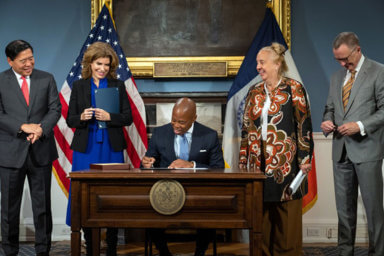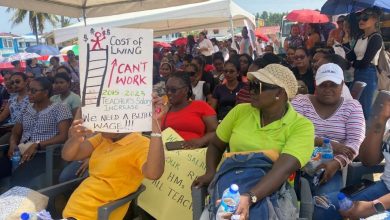Adams signs legislation promoting broad-based economic recovery

New York City Mayor Eric Adams on Tuesday signed two bills to promote a broad-based, equitable economic recovery in New York City.
One of the bills — Intro. 116 — fulfills a key commitment from the mayor’s “Renew, Rebuild, Reinvent: A Blueprint for New York City’s Economic Recovery” to create an “NYC Business Portal” that will offer all required applications, permits, licenses, and other documentation needed to open and operate a business in the city on a single, user-friendly digital interface.
“For too long, the boulder of bureaucracy has gotten in the way of working New Yorkers and small business owners,” said Mayor Adams. “Small businesses are driving our recovery, and we want to make it easier for New Yorkers to set up shop across the five boroughs.
“With the signing of these two bills, we will ensure we are serving our small business community better through a one-stop shop portal to help them open and operate their businesses and by keeping better data on commercial vacancies in our city,” he added. “Promises made, promises kept.”
Intro. 116 — sponsored by New York City Councilmember Julie Menin — would require the commissioner of the New York City Department of Small Business Services (SBS) to create a “One-Stop Shop NYC Business Portal” that would offer all applications, permits, licenses and related documentation needed to open and operate a small business in the city in a single, easily accessible and easy-to-navigate location.
A user could submit and check on the status of applications, permits and licenses through this portal, as well as settle or pay any outstanding balances on notices of violation.
The SBS commissioner also must review the effectiveness and efficiency of the portal every three years, including through a survey of participating small businesses.
The administration committed to building a one-stop-shop Business Portal in its economic recovery blueprint, allowing every business in New York City to execute and track all interactions with the city in real time.
The portal will ensure greater accessibility and transparency, enable more predictability of processing times, and facilitate compliance with city rules and regulations.
The buildout of the portal is underway, with SBS, the New York City Office of Technology and Innovation, and the Mayor’s Office of Efficiency spearheading an interagency taskforce earlier this year.
Intro. 383 — sponsored by New York City Councilmember Gale Brewer — would require that supplemental registration statements for commercial properties be filed by Aug. 15 (for the period from Jan. 1 through June 30) and Feb. 15 (for the period from July 1 through Dec. 31) each year, rather than a single filing on June 30, as required under current law.
Supplemental registration statements would be required for any property that is vacant at the end of a given reporting period.
It would also require that the New York City Department of Finance (DOF) release this supplemental registration statement data within 60 days of the reporting deadline, compared to within six months under current law. The bill’s goal is to increase the frequency and timeliness of reported data on commercial vacancies in the city.
“Re-envisioning the use of vacant commercial properties is critical to bringing our city’s economy back and building an equitable future,” said First Deputy Mayor Lorraine Grillo. “But to manage it, you have to measure it. Intro. 383 will help us do just that, by providing more timely data on commercial vacancies that can help inform decision-making going forward.”
“Small businesses are the backbone of our local economy, and so many of them continue to struggle as our city recovers from the COVID-19 pandemic,” said Deputy Mayor for Economic and Workforce Development Maria Torres-Springer. “Through the new ‘One-Stop Shop NYC Business Portal,’ we will clear away bureaucratic obstacles for small business owners, allowing them to focus their time and energy on growing their core business.”
“From dry cleaners to bars and restaurants, businesses across the five boroughs all want one thing: a seamless and streamlined 21st-century website that makes it easier to navigate government permits, licenses, and regulations,” said SBS Commissioner Kevin D. Kim.
“SBS continues to develop this initiative as a priority item from Mayor Adams’ economic blueprint, and we thank Councilmember Menin for her legislation codifying this groundbreaking business portal into law,” he added.
“Creating a more timely and standardized reporting method for tracking vacant commercial properties is key to supporting our small business community and strengthening our local economy,” said DOF Commissioner Preston Niblack. “By simplifying the process to report this valuable information, we can better serve the public and improve communities overwhelmed by empty storefronts. It’s a win-win for all New Yorkers.”
“As a former small business owner, I understand how frustrating it is to traverse through the alphabet soup of city agencies to maintain and open a small business,” said Menin, chair, Committee on Small Business.
“Centralizing the process of obtaining vital permits and licenses to operate your business will make a world of difference,” she added. “Small business owners and entrepreneurs don’t have the time to figure out the logistics of being in compliance, and creating a one-stop shop business portal provides the necessary support that our small businesses need to survive and thrive. Thank you to Mayor Adams for signing my bill into law, which will provide much-needed assistance for our small businesses across the city.”
“High rates of commercial vacancy and a blight of empty storefronts negatively impact quality of life and stifle economic growth. As borough president, I sponsored legislation with Speaker Corey Johnson and Councilmember Helen Rosenthal to establish the first-in-the-nation publicly accessible database to track retail vacancies,” Brewer said. “The database went live in 2021, but work needs to be done to increase its usefulness as a tool to address continued commercial vacancy.
“Introduction 383 will require reporting on vital information to assess the proliferation of commercial vacancies — including whether ground-floor commercial properties are currently vacant, owner- or commercial tenant-occupied, and the expiration date of the last lease,” she added. “This will provide more data to observe patterns and trends to make better decisions.”




